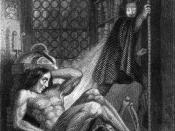In the novel Frankenstein, Mary Shelley portrays Victor Frankenstein as a man who's goal is to reanimate and bring life back to something that is dead. Frankenstein and his creation are an example of a worst-case scenario of science and advancements in technology.
The concept of recreating life and playing the role of God is appealing to Victor Frankenstein. "It was the secrets of heaven and earth that I desired to learn; and whether it was the outward substance of things, or the inner spirit of nature and the mysterious soul of man that occupied me, still my inquiries were directed to the metaphysical, or, in its highest sense, the physical secrets of the world" (35). Frankenstein describes his desire to study and learn about the secrets of life and death. He successfully finds the key to life, and creates a creature, bringing it to life.
A common fear of technology is technology going too far, perhaps even mimicking god-like powers, such as creating life or in some cases, reversing God's actions by reversing death and bringing a deceased being back to life.
"Frightful must it be, for supremely frightful would be the effect of any human endeavor to mock the stupendous mechanism of the Creator of the world" (7). Frankenstein does just this. He, a human ends up creating life, mocking God. This creation is responsible for the death of his loved ones, and many other people as well.
Once Frankenstein finishes his creation and gives it life, he is quickly sickened with it. "â¦Now that I had finished, the beauty of the dream vanished and breathless horror and disgust filled my heart" (55). He is filled with guilt and regret after spending two years working on his creation. Ironically, he is disgusted by its looks, yet...


